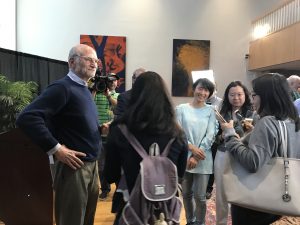Two Brandeis professors were awarded the Nobel Prize in physiology or medicine Monday morning for their work studying circadian rhythms. Biology Professor Michael Rosbash and Professor Emeritus Jeffrey Hall both came to Brandeis in the 1970’s and soon developed a professional partnership, and close friendship, that led to major breakthroughs in our understanding of humans’ “inner clocks.”

“The phone call at 5:10 this morning destroyed my circadian rhythms,” joked Rosbash, who is also the Peter Gruber Endowed Chair in Neuroscience, at a celebratory gathering on campus Monday. President Ron Liebowitz too joked about his circadian rhythms, as did Brandeis press articles on the award.
“We at Brandeis certainly could not be prouder of our two professors,” said Liebowitz on Monday. Brandeis arranged the gathering for 11 a.m., and 30 minutes after a campus-wide announcement, hundreds poured into the Rappaport Treasure Hall to hear from Rosbash and toast with champagne. Guests stood packed together in the back of the room and more listened from outside the door.
Liebowitz described Rosbash as a dedicated member of the Brandeis community. He called him the the “number one fan” of Brandeis’ basketball team and “the kind of Brandeis professor who comes to [Admitted Students Day] and and invites them into his lab, where they see for themselves the magic created when tenured professor interact and engage with undergraduates, doctoral students and post docs all in the same space and all working together.”
At the top of his speech, Rosbash thanked the undergraduates, graduate students and postdocs who have assisted him the lab over the years. “It’s impossible to name them all at this point,” he said.
Rosbash continues to work in his lab and teach courses at Brandeis, though Hall retired in 2008 and retains emeritus status. He was unable to make it down from his home in Maine for the celebration. Rosbash and Hall share the award with Michael Young, a professor at Rockefeller University, and all three will split the $1.1 million prize.
Rosbash and Hall were recognized for papers they published between 1984 and 1992. The scientists helped uncover the “molecular mechanism,” that governs our internal body clocks. They studied fruit flies and isolated a gene that regulates circadian rhythm. They studied the “PER” protein and took note of the way its levels in the cell rise and fall throughout the hours of the day and, after continuing research, they found the messenger RNA (which carry instructions throughout a cell) that sets off its production. The scientists discovered the “feedback loop” that causes PER molecules to appear and disappear.
“Understanding the molecular mechanism of behavior is one of the holy grails in biology,” said Professor Eve Marder (NERO) on Monday.
This work was not always so well respected within the scientific community. “The idea that studying the activity rhythms of an insect would have an impact on human health was not something that really many people would have thought about 25, 30 years ago. But it has,” said Professor Leslie Griffith (BIO) at the event on Monday. Multiple speakers noted the research could have bearing on alzheimer’s, disease susceptibility, mental health and even cancer.
The practical applications for this research are still on the horizon, said Rosbash, but he sees “reason to imagine” the possibilities because so many of our cells are affected by circadian rhythm.
Provost Lisa Lynch recognized the professors for their “willingness to think about problems in a different way, for being unconventional in [their] scientific thought,” and for working through the “challenges” and “frustrations,” that brought them to this award.
This is the first Nobel prize for “longtime Brandeis faculty members,” said Liebowitz in a campus-wide email. According to his message, Saul Bellow earned the the 1976 prize for literature prior to joining Brandeis as a visiting professor, and John Nash, who taught at Brandeis in the 60s, won the Nobel for economic sciences in 1995. One alumnus, Rod MacKinnon 78, H’05, won the Nobel in 2003.
As the Boston Globe’s coverage of Rosbash and Hall takes note, Brandeis is a smaller institution with a much smaller endowment than other Boston-area “research powerhouses.” It boasts fewer Nobels compared to MIT’s 89 or Harvard’s 49. On Tuesday, an MIT professor won the Nobel Prize in physics.
“We have always been resource poor and human capital rich,” said Rosbash, explaining that in this smaller environment, there is a lot of collaboration and that Brandeis “[gets] a lot of mileage out of our resources.”
Asked what advice he would give young science students, Rosbash said, “Find your star, find something you love and go for it.”
“I’m stunned by this news, and will remain, I hope your colleague and friend” he concluded in his speech. This spring, Rosbash will teach a course on sleep, “the behavioral, cellular and molecular control of sleep and its effects on physiology,” according to the course listings.


